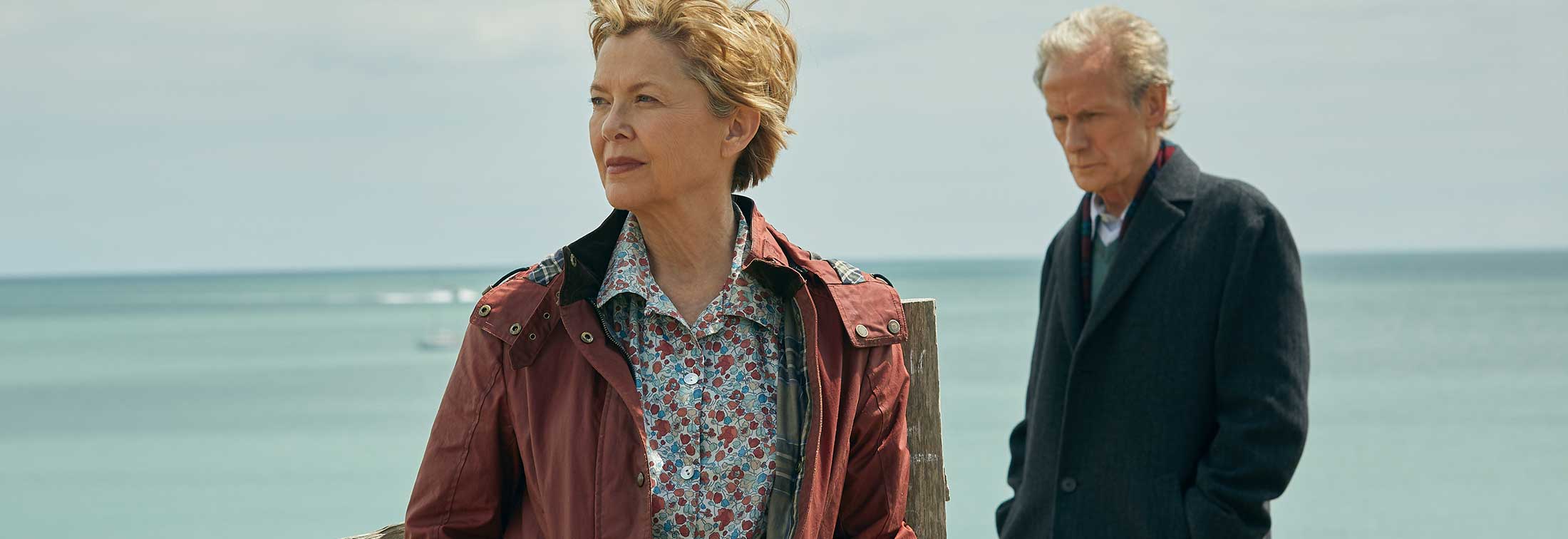

There have been plenty of films in the past that focus on a child experiencing their parents' divorce - most recently the excellent 'Marriage Story' - but not that many centred around a grown-up child. At least, that's how writer/director William (Bill) Nicholson felt going into this project. A 28-year-old at the time, Nicholson has been through this harrowing ordeal, so as part therapy and part writing about what you know, 'Hope Gap' is a film on the struggles on being your own parents' anchor.
Edward (Bill Nighy, 'About Time', 'Love Actually') and Grace (Annette Bening, '20th Century Women', 'American Beauty') are on the cusp of their 29th wedding anniversary. Edward spends his days teaching history and annotating Wikipedia pages, whilst Grace goes to church and compiles poetry. They drink tea by the gallon, but integrally, they are worlds apart in their emotional health. Edward seems distant and appears to be forever drifting further away, but Grace believes everything is just fine and they are just going through a phase. Residing in the seaside town of Seaford in England, things take a dramatic turn when Edward asks their son Jamie (Josh O'Connor, 'Emma.', 'God's Own Country') to visit for the weekend, purely to soften the blow of his big announcement - that he has fallen in love with someone else, and he is going leaving the family.
'HOPE GAP' TRAILER
It's always interesting to see such a personal story from a director, particularly as an insight into their therapeutic mindset. The title, 'Hope Gap', goes some way to explain the major themes of the film. Named after the rockpools by the cliffs, it was always Jamie's favourite place to visit after the tide had fallen away, so he could witness all the crabs living the crevasses of the rocks. To me, this is a great symbolic undertaking, as when everything drifts away, it's the wonder and hope that remains. And for the characters of the story, hope is imperative to survival.
Without going too much into what unfolds in this film, Edward doesn't feel like himself, and whilst determined to label his newfound love as an accident, he's finally able to be happy and comfortable in his own skin. This all comes as a complete shock to Grace who, by all accounts, is deeply in love with her spouse and sees nothing wrong in their relationship. Her husband leaving breaks her; she is inconsolable and desperate, the depth of which is shown in one heart-wrenching visual of her just sitting on the staircase, waiting. She even leaves notes that say "I love you" around the house, just in case Edward comes back and finds them. So, it all falls on Jamie, who feels he has no choice but to mend his parents and put them back on the right path, whether that means separated or not.
No child should have to go through what Jamie does. He's in denial, upset, angry, and ultimately blames himself. He has to go from playing the victim to being the saviour, all in a short space of time, and as Nicholson wants his audience to know, that will come with a significant burden. It would be fascinating to know how much of Nicholson's past is reflected in this, as the rawness of dealing with a parents' divorce is clear to see.
Regrettably, whilst the themes 'Hope Gap' explore are interesting and necessary, it ultimately all feels a little bit empty.
Regrettably, whilst the themes that 'Hope Gap' explores are interesting and necessary, it ultimately all feels a little bit empty. Bening is, as always, absolutely brilliant, riding the emotional waves of the script with great professionalism. However, the script is not up to her standards. I can respect Nicholson's process and the pain he must have had to conjure to compile the screenplay, but I can't help but feel it would have been better served as a play. The film predominantly takes place around kitchen tables with everyone sipping tea, so the intimacy in setting is there to be translated to stage. In saying that, the script would need to be so much tighter, as it too often felt loose and wanting.
Similarly to Bening, O'Connor is great playing the role of the emotional support. I first noticed him on TV's 'The Crown', and I am certain we will get much more from him in the future. He and George Mackay are on an exciting trajectory to super-stardom. Bill Nighy, on the other hand, is oddly bland. His character goes through no real development, and I would have liked more from him. He seemed to repeat the same lines over and over, without ever really grabbing hold of the magnitude of the situation. It's not so much that he looked like he couldn't be bothered, but I'm afraid there just wasn't enough meat to his role. For such a key part of the story, audiences are left wanting.
There are some heartwarming scenes and some light laughs, which act nicely against some genuinely devasting moments. Watching a family cause each other so much pain is difficult, but whilst the depth and intelligence of 'Marriage Story' is harrowing and packs emotional punch, 'Hope Gap' leaves you feeling much hollower. Audiences aren't taken on a ride with the script, and you feel more like a spectator than experiencing any part of it. All the ingredients are there to make this work, but if it wasn't for Bening's unbelievable ability to heighten the script, there wouldn't be much to it.
Come the conclusion of 'Hope Gap', audiences certainly feel that there is hope, but the gaps along the way are too frequent to feel any genuine satisfaction. I sincerely hope that Nicholson achieved what he set out to do, but as for taking audiences along for his therapy ride, it's not needed. Go for the acting masterclass, stay for the unbelievable amounts of tea and the gorgeous seaside, but don't expect to leave with much more.